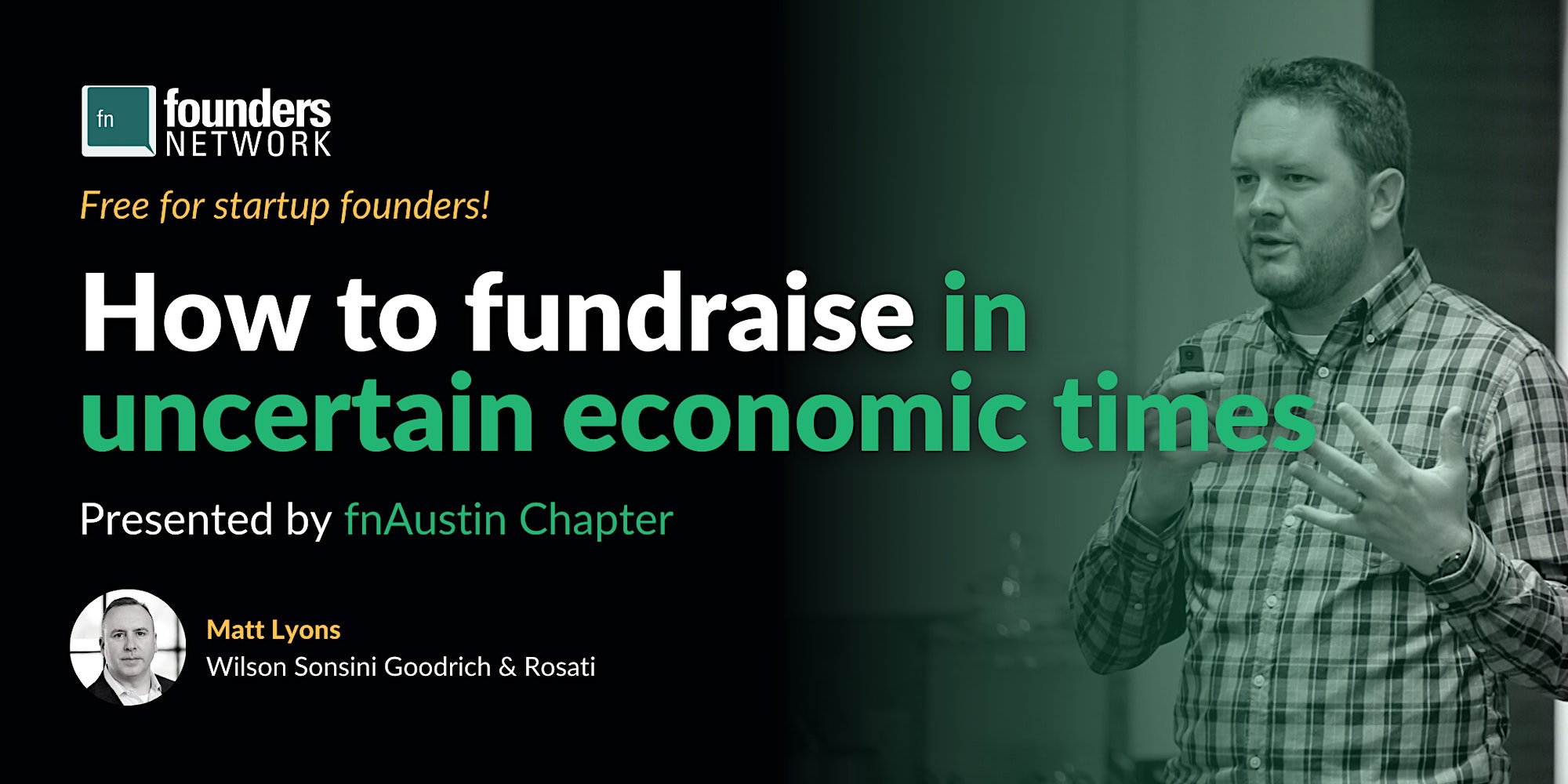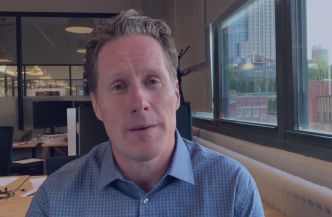


- This event has passed.
September 27, 2022 @ 9:30 am - 10:30 am PDT
FreeHow to Fundraise in Uncertain Economic Times with Matt Lyons
While job growth remains relatively strong, economists have been speculating about an impending recession since the beginning of the year. In fact, June was the worst first half of a year for the stock market since 1970. With the fastest inflation in decades and rising interest rates, many are tightening their belts, unsure of what comes next for the economy.
For startup founders trying to fundraise, the economic climate means funding might be harder to come by. They may see that investors have a smaller appetite for infusing capital into high-risk early-stage companies. Austin-based corporate attorney Matt Lyons has seen startups and investors through decades of economic cycles, and he’s identified what helps founders weather these kinds of financial storms.
Lyons is a corporate partner in the Austin office of Wilson Sonsini Goodrich & Rosati, where he focuses on representing emerging companies and their investors. On Sept. 27, Lyons will host a webinar for Founders Network members where he will discuss how to fundraise in uncertain financial times.
In this webinar, Lyons will cover:
- How to get creative with bootstrapping
- Why you should focus on hiring during tough times
- How to extend your runway by evaluating your budget
About the Speaker:
J. Matthew (Matt) Lyons is a corporate partner in the Austin office of Wilson Sonsini Goodrich & Rosati, where his practice focuses on the representation of companies and their investors in the
emerging companies ecosystem. For the past 25 years, he has been a leading attorney in the Texas market, advising public and private companies, venture and private equity funds, and entrepreneurs on new entity formation, venture financings, public and private offerings, mergers, acquisitions and divestitures, and issues related to corporate governance and executive compensation. Matt’s clients include companies in the technology, life sciences, healthcare, retail and CPG, and media and communications industries.
About Wilson Sonsini Goodrich & Rosati:
Wilson Sonsini Goodrich & Rosati is the premier legal advisor to technology, life sciences, and other growth enterprises worldwide. We represent companies at every stage of development, from entrepreneurial start-ups to multibillion-dollar global corporations, as well as the venture firms, private equity firms, and investment banks that finance and advise them.
The firm is nationally recognized as a leader in the fields of corporate governance and finance, mergers and acquisitions, private equity, securities litigation, employment law, intellectual property, and antitrust, among many other areas of law. Our distinguished international roster of clients spans a wide variety of industries, including information technology, life sciences, energy and clean technology, social and traditional media, communications, retail, and financial services.
WSGR has offices in Austin; Beijing; Boston; Brussels; Hong Kong; London; Los Angeles; New York; Palo Alto; San Diego; San Francisco; Seattle; Shanghai; Washington, D.C.; and Wilmington, DE.
Calling all WSGR alum: Stay connected to alumni, colleagues, and friends on our WSGR Alumni Network, featuring exclusive content and other special offers. Through the site, we share information with alumni about career opportunities; programs and events; alumni, legal industry, and business news; and professional development training, among other topics. Whether you’re looking to expand your professional network, find an expert in your field, renew old friendships or establish new ones, or give back by becoming a career mentor, this website is the right place for you.
Visit the following link to sign up: www.wsgralumni.com
Follow us on Twitter: @wilsonsonsini
fnAustin Chapter Leadership Team
- Chapter Director: Jason Collier
- Membership Chair: Lisa Besserman
Complimentary Ticket:
Are you a full-time tech founder? Be our guest! During COVID, we’re making our events available to tech founders everywhere. Enjoy a complimentary ticket to come learn from fellow tech founders, partners and investors. Already used your complimentary guest pass? Request an invite to see if you qualify for membership.
About Founders Network:
Founded in 2011, Founders Network offers lifelong peer mentorship to over 600 tech startup founders globally. Our platform, programs and high-touch service facilitate authentic experience sharing, warm introductions and long-term professional relationships. Additional benefits include over $500k in startup discounts and promotion to 2,000 newsletter readers. Members are located in San Francisco, New York City, Los Angeles, Vancouver, Toronto, London and other tech hubs. Each month our Membership Committee admits a new cohort of full-time tech founders who are nominated by an existing member. Learn more about us here
Confidentiality Policy
All information shared within Founders Network is strictly confidential. We are built on a foundation of trust, and the community takes confidentiality seriously. Investors, members, and staff all share experiences and opinions off the record. In this roundtable forum, we continue to model our fnValues of Reciprocity, Humility, Authenticity and Inclusivity. Read more about our Privacy Policy here.
Testimonials

"If you don't have a cohort group in something like Founders Network that you can develop long-term relationships with and discuss the same topics that come up with people that you already know, you're probably missing out on something very important."David Plonsky

"The number one advantage is the law of compound interest. The longer you stay in a very high-quality network the strong and more authentic relationships you build."Chaitanya Vaidya

"We know each other's business and we know each other's struggles. Having a personal relationship with other founders that is completely confidential and completely authentic gives you a lot of great advice."Doug Lessing

"FN manages my network for me by connecting me with other founders in my specific industry sector. I've been able to explore business development opportunities, partnerships, etc."Becky Splitt

"We just saw the first Mexican unicorn come to life this same week which is a fantastic idea. Being part of the Founders Network makes a lot of sense. We see that the Mexico City chapter is growing substantially."Max Linares

"There's a lot of great stuff going on even now in San Francisco. I've found Founders Network has been a great resource for me and for all of the founders I know during these tough times."Jarie Bolander

"It allowed me to meet people who had done this before that had the experience. I was able to explain an issue very briefly and they were able to give me a very detailed response on how they addressed it."Terence Finn

"I've used the platform to discover advice, connections, resources, discounts, on important services, connections to investors, and practice on how to pitch. The kind of conversations you can't get anywhere else on youtube or google searches."Alexandra Greenhill

"I see Founders Network as one of those necessary resources in the Chicagoland area."Jason Jacobsohn

"The Black Founders initiative allows me to shape this program where we can inspire, engage, and support Black Founders."Khiry Kemp

